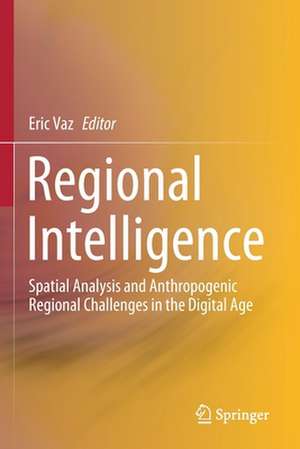Regional Intelligence: Spatial Analysis and Anthropogenic Regional Challenges in the Digital Age
Editat de Eric Vazen Limba Engleză Paperback – 17 mar 2021
Given its scope, the book will appeal to scholars and students of regional and spatial sciences and geography, as well as practitioners and decision makers engaged in regional planning and policymaking, looking for new methodological approaches that offer insights into sustainable development, regional prosperity, and livability. As a unique contribution, this book challenges the status quo on how complex spatial problems at an international level and at multiple scalescan be comprehended.
| Toate formatele și edițiile | Preț | Express |
|---|---|---|
| Paperback (1) | 997.09 lei 43-57 zile | |
| Springer International Publishing – 17 mar 2021 | 997.09 lei 43-57 zile | |
| Hardback (1) | 1003.07 lei 43-57 zile | |
| Springer International Publishing – 17 mar 2020 | 1003.07 lei 43-57 zile |
Preț: 997.09 lei
Preț vechi: 1215.96 lei
-18% Nou
Puncte Express: 1496
Preț estimativ în valută:
190.79€ • 199.74$ • 157.87£
190.79€ • 199.74$ • 157.87£
Carte tipărită la comandă
Livrare economică 07-21 aprilie
Preluare comenzi: 021 569.72.76
Specificații
ISBN-13: 9783030364816
ISBN-10: 303036481X
Ilustrații: VI, 249 p. 65 illus., 55 illus. in color.
Dimensiuni: 155 x 235 mm
Greutate: 0.36 kg
Ediția:1st ed. 2020
Editura: Springer International Publishing
Colecția Springer
Locul publicării:Cham, Switzerland
ISBN-10: 303036481X
Ilustrații: VI, 249 p. 65 illus., 55 illus. in color.
Dimensiuni: 155 x 235 mm
Greutate: 0.36 kg
Ediția:1st ed. 2020
Editura: Springer International Publishing
Colecția Springer
Locul publicării:Cham, Switzerland
Cuprins
Part I: Sustainable Development and Regional Intelligence.- Part II: Land Use, Economic Landscape, and Regional Intelligence.- Part III: Social Issues and Regional Intelligence.
Notă biografică
Eric M.N. Vaz is a tenured Professor at Ryerson University, Canada. He is currently serving as President of the Canadian Regional Science Association, and as Editor-in-Chief of the Journal of Canadian Regional Science. His research chiefly focuses on the interaction of regional science with geographic analysis in the Anthropocene.
Textul de pe ultima copertă
Regional Intelligence is an emerging field that leverages the lessons learned through decades of regional science. By merging spatial analysis with quantitative analytical techniques in the Anthropocene, this book contributes to the multidisciplinary understanding of regional issues. The locational aspects of regional paradigms are explored through various empirical studies that promote a rich and diversified understanding of regional issues concerning policy, governance, land use, and territorial decisions.
Given its scope, the book will appeal to scholars and students of regional and spatial sciences and geography, as well as practitioners and decision makers engaged in regional planning and policymaking, looking for new methodological approaches that offer insights into sustainable development, regional prosperity, and livability. As a unique contribution, this book challenges the status quo on how complex spatial problems at an international level and at multiple scales can be comprehended.
Caracteristici
Promotes and contributes to a multidisciplinary approach to spatial analysis Highlights methods that leverage regional science through applied spatial analytical approaches at the local level Demonstrates how regional issues can be articulated at multiple levels of policy decisions in the Anthropocene
